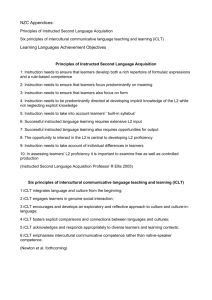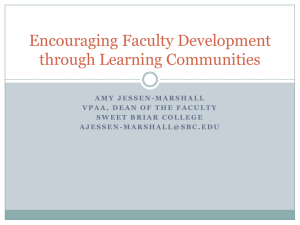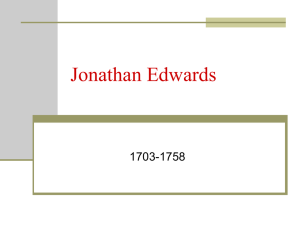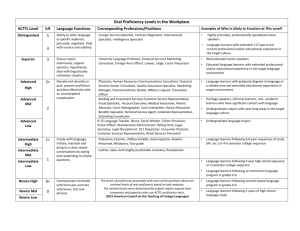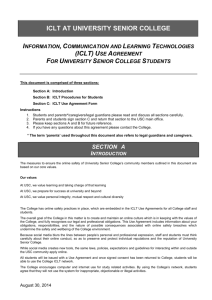Learning Languages Planning Template Dee Edwards adaptation
advertisement
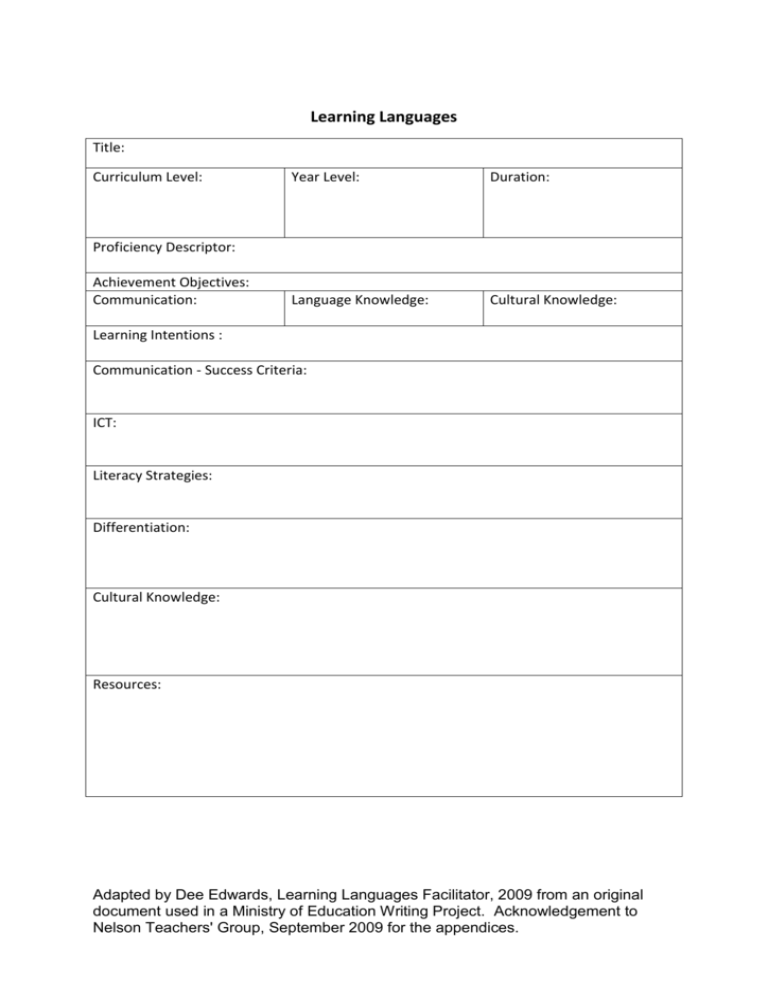
Learning Languages Title: Curriculum Level: Year Level: Duration: Language Knowledge: Cultural Knowledge: Proficiency Descriptor: Achievement Objectives: Communication: Learning Intentions : Communication - Success Criteria: ICT: Literacy Strategies: Differentiation: Cultural Knowledge: Resources: Adapted by Dee Edwards, Learning Languages Facilitator, 2009 from an original document used in a Ministry of Education Writing Project. Acknowledgement to Nelson Teachers' Group, September 2009 for the appendices. Assessment Task: Adapted by Dee Edwards, Learning Languages Facilitator, 2009 from an original document used in a Ministry of Education Writing Project. Acknowledgement to Nelson Teachers' Group, September 2009 for the appendices. Learning Experiences KCs Ellis principles iCLT principles Adapted by Dee Edwards, Learning Languages Facilitator, 2009 from an original document used in a Ministry of Education Writing Project. Acknowledgement to Nelson Teachers' Group, September 2009 for the appendices. Teacher Inquiry Evidence Adapted by Dee Edwards, Learning Languages Facilitator, 2009 from an original document used in a Ministry of Education Writing Project. Acknowledgement to Nelson Teachers' Group, September 2009 for the appendices. Appendices: Principles of Instructed Second Language Acquisition Principles of intercultural communicative language teaching and learning (iCLT) Learning Languages Proficiency Descriptors and Achievement Objectives Principles of Instructed Second Language Acquisition 1: Instruction needs to ensure that learners develop both a rich repertoire of formulaic expressions and a rule-based competence 2: Instruction needs to ensure that learners focus predominantly on meaning 3: Instruction needs to ensure that learners also focus on form 4: Instruction needs to be predominantly directed at developing implicit knowledge of the L2 while not neglecting explicit knowledge 5: Instruction needs to take into account learners' `built-in syllabus' 6: Successful instructed language learning requires extensive L2 input 7: Successful instructed language learning also requires opportunities for output 8: The opportunity to interact in the L2 is central to developing L2 proficiency 9: Instruction needs to take account of individual differences in learners 10: In assessing learners' L2 proficiency it is important to examine free as well as controlled production (Instructed Second Language Acquisition Professor R Ellis 2005) Six principles of intercultural communicative language teaching and learning (iCLT) 1 iCLT integrates language and culture from the beginning; 2 iCLT engages learners in genuine social interaction; 3 iCLT encourages and develops an exploratory and reflective approach to culture and culture-in-language; 4 iCLT fosters explicit comparisons and connections between languages and cultures; 5 iCLT acknowledges and responds appropriately to diverse learners and learning contexts; 6 iCLT emphasises intercultural communicative competence rather than native-speaker competence. (Newton et al. forthcoming) Adapted by Dee Edwards, Learning Languages Facilitator, 2009 from an original document used in a Ministry of Education Writing Project. Acknowledgement to Nelson Teachers' Group, September 2009 for the appendices. Learning Languages Achievement Objectives Level 1 and 2 Proficiency descriptor: Students can understand and use familiar expressions and everyday vocabulary. Students can interact in a simple way in supported situations. Communication Achievement Objectives: In selected linguistic and sociocultural contexts, students will: * Receive and produce information. * Produce and respond to questions and requests. * Show social awareness when interacting with others. Language knowledge Students will: * Recognise that the target language is organised in particular ways. * Make connections with their own language(s). Cultural knowledge Students will: * Recognise that the target culture(s) is (are) organised in particular ways. * Make connections with known culture(s). Level 3 and 4 Proficiency descriptor: Students can understand and construct simple texts using their knowledge of the target language. Students can describe aspects of their own background and immediate environment. Communication Achievement Objectives: In selected linguistic and sociocultural contexts, students will: * Understand and produce information and ideas. * Express and respond to personal needs and interests. * Use cultural knowledge to communicate appropriately. Language knowledge Students will: * Recognise and describe ways in which the target language is organised. * Compare and contrast languages. Cultural knowledge Students will: * Recognise and describe ways in which the target culture(s) is (are) organised. * Compare and contrast cultural practices. Adapted by Dee Edwards, Learning Languages Facilitator, 2009 from an original document used in a Ministry of Education Writing Project. Acknowledgement to Nelson Teachers' Group, September 2009 for the appendices. Level 5 and 6 Proficiency descriptor: Students can understand and produce more complex language. They can communicate beyond the immediate context, for example, about past and future events. Students can understand and produce a variety of text types. Communication Achievement Objectives In selected linguistic and sociocultural contexts, students will: * Communicate information, ideas, and opinions through different text types. * Express and respond to personal ideas and opinions. * Communicate appropriately in different situations. Language knowledge Students will: * Understand ways in which the target language is organised for different purposes. Cultural knowledge Students will: * Understand ways in which the target culture(s) is (are) organised for different purposes. Level 7 and 8 Proficiency descriptor: Students can use language variably and effectively to express and justify their own ideas and opinions and support or challenge those of others. They are able to use and identify the linguistic and cultural forms that guide interpretation and enable them to respond critically to texts. Communication Achievement Objectives: In selected linguistic and sociocultural contexts, students will: * Communicate information, ideas, and opinions through increasingly complex and varied texts. * Explore the views of others, developing and sharing personal perspectives. * Engage in sustained interaction and produce extended text. Language knowledge Students will: * Analyse ways in which the target language is organised in different texts and for different purposes. * Explore how linguistic meaning is conveyed across languages. Adapted by Dee Edwards, Learning Languages Facilitator, 2009 from an original document used in a Ministry of Education Writing Project. Acknowledgement to Nelson Teachers' Group, September 2009 for the appendices. Cultural knowledge Students will: * Analyse ways in which the target culture(s) is (are) organised for different purposes and for different audiences. * Analyse how the use of the target language expresses cultural meanings. Adapted by Dee Edwards, Learning Languages Facilitator, 2009 from an original document used in a Ministry of Education Writing Project. Acknowledgement to Nelson Teachers' Group, September 2009 for the appendices.
